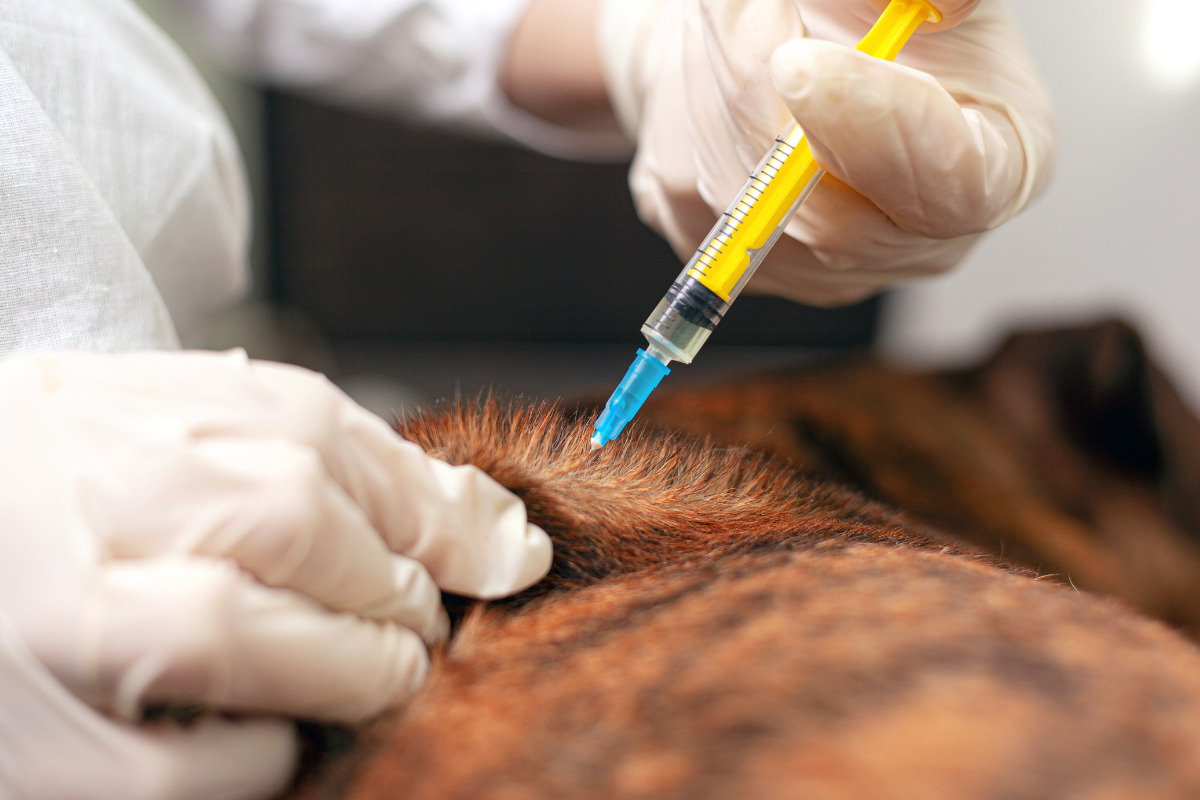Home>Health & Wellness>Common Health Issues>Muscular and Joint Health>How Long Do Arthritis Flare-Ups Last In Dogs


Muscular and Joint Health
How Long Do Arthritis Flare-Ups Last In Dogs
Modified: February 21, 2024
Learn about the duration of arthritis flare-ups in dogs and how to support their muscular and joint health. Find tips to manage and alleviate discomfort.
(Many of the links in this article redirect to a specific reviewed product. Your purchase of these products through affiliate links helps to generate commission for Pawsomeoldies.com, at no extra cost. Learn more)
Table of Contents
Introduction
Arthritis is a common condition that affects not only humans but also our beloved canine companions. It can be a source of discomfort and pain for dogs, impacting their overall quality of life. As responsible pet owners, it's crucial to understand the nature of arthritis, including its potential flare-ups, in order to provide the best care and support for our furry friends.
Arthritis, also known as osteoarthritis or degenerative joint disease, is characterized by the inflammation and degeneration of the joints. This condition can affect dogs of all ages and breeds, although it is more commonly observed in older dogs. The gradual wear and tear of the cartilage within the joints can lead to stiffness, pain, and reduced mobility, making it challenging for dogs to engage in their usual activities with ease.
While arthritis is a chronic condition, it can manifest in the form of flare-ups, during which the symptoms intensify and become more pronounced. These flare-ups can be triggered by various factors, including changes in weather, excessive physical activity, or even underlying health issues. Understanding the duration and management of arthritis flare-ups in dogs is essential for ensuring their well-being and comfort.
In the following sections, we will delve deeper into the intricacies of arthritis in dogs, exploring the causes of flare-ups, the associated symptoms, and effective strategies for managing and alleviating discomfort. By gaining a comprehensive understanding of this condition and its potential fluctuations, we can empower ourselves to provide the best possible care for our canine companions, promoting their health and happiness.
Understanding Arthritis in Dogs
Arthritis, a prevalent condition in dogs, shares similarities with its human counterpart. It is a progressive and degenerative joint disease that affects the cartilage, causing inflammation, pain, and reduced mobility. The most common form of arthritis in dogs is osteoarthritis, which develops over time due to wear and tear on the joints. This wear and tear can be attributed to factors such as aging, genetics, obesity, previous joint injuries, or developmental disorders.
The onset of arthritis in dogs often goes unnoticed in its early stages, as dogs are adept at masking signs of discomfort. However, as the condition progresses, subtle changes in behavior and movement become apparent. Dogs with arthritis may exhibit stiffness, reluctance to engage in physical activities, and difficulty rising from a lying position. Additionally, they may display signs of pain, such as whimpering or licking at the affected joints.
It's important to note that arthritis can affect any joint in a dog's body, including the hips, knees, elbows, and spine. As the disease advances, the joints may become swollen, warm to the touch, and visibly deformed. These physical manifestations serve as indicators for pet owners to seek veterinary care and implement appropriate management strategies.
Understanding the nature of arthritis in dogs involves recognizing that it is a chronic condition with the potential for flare-ups. While the disease cannot be cured, its impact can be mitigated through proactive measures and targeted interventions. By gaining insights into the underlying mechanisms of arthritis and its implications for canine health, pet owners can take informed steps to support their furry companions and enhance their overall well-being.
What Causes Arthritis Flare-Ups in Dogs
Arthritis flare-ups in dogs can be triggered by various factors, exacerbating the discomfort and mobility challenges associated with the condition. Understanding these potential triggers is crucial for pet owners seeking to manage their canine companions' arthritis effectively.
-
Weather Changes: Dogs, like humans, can be sensitive to changes in weather. Cold and damp conditions can intensify arthritis symptoms, causing joints to become stiffer and more painful. Similarly, sudden shifts in temperature or barometric pressure can contribute to flare-ups, prompting increased discomfort for dogs with arthritis.
-
Physical Exertion: Engaging in excessive physical activity or strenuous exercise can strain the already compromised joints of arthritic dogs, leading to flare-ups. Overexertion can exacerbate inflammation and pain, making it essential for pet owners to monitor and regulate their dogs' activity levels to prevent flare-ups.
-
Weight Management: Obesity is a significant risk factor for arthritis in dogs, as excess weight places added strain on the joints. Flare-ups can occur when overweight dogs engage in activities that further stress their joints, such as jumping or running. Maintaining a healthy weight through a balanced diet and regular exercise can help mitigate the risk of flare-ups.
-
Joint Stress: Certain activities, such as jumping onto elevated surfaces or navigating challenging terrains, can place stress on a dog's joints, potentially triggering flare-ups. Pet owners should consider implementing measures to minimize joint stress, such as providing ramps or steps for dogs to access elevated areas and choosing gentle walking paths to reduce impact on the joints.
-
Underlying Health Conditions: Dogs with arthritis may also have concurrent health issues, such as infections or injuries, which can contribute to flare-ups. Identifying and addressing these underlying conditions is essential for managing arthritis effectively and minimizing the frequency of flare-ups.
By recognizing these potential triggers, pet owners can take proactive steps to minimize the likelihood of arthritis flare-ups in their dogs. Implementing strategies to mitigate the impact of weather changes, regulate physical activity, manage weight, reduce joint stress, and address concurrent health issues can significantly contribute to enhancing the comfort and well-being of dogs with arthritis.
Symptoms of Arthritis Flare-Ups in Dogs
Arthritis flare-ups in dogs can manifest through a range of symptoms, signaling an exacerbation of the underlying joint disease. Recognizing these symptoms is crucial for pet owners, as it enables timely intervention and targeted management strategies to alleviate their canine companions' discomfort. Here are the key symptoms indicative of arthritis flare-ups in dogs:
-
Increased Limping and Lameness: During a flare-up, dogs with arthritis may exhibit heightened limping or lameness, particularly after periods of rest or inactivity. The affected limb(s) may appear stiff, and the dog may struggle to bear weight on the affected joints.
-
Visible Signs of Pain: Dogs experiencing arthritis flare-ups may display overt signs of discomfort, such as vocalizing in response to movement, whimpering, or exhibiting signs of agitation when attempting to move or rise from a lying position.
-
Reduced Mobility and Reluctance to Move: Arthritic dogs may demonstrate a reluctance to engage in physical activities they previously enjoyed. They may exhibit hesitancy when climbing stairs, jumping onto furniture, or participating in play, indicating increased discomfort during movement.
-
Joint Stiffness and Swelling: Flare-ups can lead to noticeable swelling and stiffness in the affected joints. The joints may feel warm to the touch, and the surrounding tissues may appear inflamed, signaling an exacerbation of the underlying arthritis.
-
Behavioral Changes: Dogs in the midst of an arthritis flare-up may display changes in behavior, such as increased irritability, restlessness, or withdrawal. These behavioral shifts can be attributed to the discomfort and pain associated with the flare-up.
-
Difficulty Rising and Lying Down: Arthritic dogs may struggle with the basic movements of rising from a lying position or lying down comfortably. They may exhibit hesitancy, trembling, or vocalization during these actions, reflecting the challenges posed by the flare-up.
-
Licking or Chewing at Joints: In response to heightened discomfort, dogs may resort to licking or chewing at the affected joints, attempting to alleviate the pain through self-soothing behaviors.
By remaining vigilant for these symptoms, pet owners can promptly identify and address arthritis flare-ups in their dogs, ensuring that appropriate measures are taken to alleviate discomfort and support their furry companions' joint health. Early recognition of these symptoms empowers pet owners to seek veterinary guidance and implement targeted interventions to mitigate the impact of arthritis flare-ups on their dogs' well-being.
Duration of Arthritis Flare-Ups in Dogs
The duration of arthritis flare-ups in dogs can vary significantly, influenced by factors such as the severity of the underlying arthritis, the effectiveness of management strategies, and the overall health and resilience of the individual dog. While there is no definitive timeline that universally applies to all dogs experiencing arthritis flare-ups, it is essential for pet owners to be attuned to the potential duration of these episodes in order to provide appropriate support and care for their furry companions.
Arthritis flare-ups can range from transient episodes of heightened discomfort lasting a few days to more prolonged periods of exacerbated symptoms extending over several weeks. The duration of a flare-up is often linked to the specific triggers and contributing factors, with some flare-ups subsiding relatively quickly once the inciting cause is addressed, while others may persist due to ongoing challenges such as weather changes or underlying health issues.
In cases where the flare-up is triggered by a temporary factor, such as a sudden change in weather or a brief period of excessive physical activity, the duration may be relatively short-lived. Once the triggering factor is mitigated or resolved, the symptoms of the flare-up may gradually diminish, and the dog's comfort levels may improve within a matter of days.
However, for dogs with more chronic and severe arthritis, flare-ups may endure for an extended period, with symptoms persisting over weeks. These prolonged flare-ups often necessitate a comprehensive approach to management, including veterinary intervention, tailored medication, and adjustments to the dog's environment and activity levels to alleviate the ongoing discomfort and promote joint health.
It is important for pet owners to closely monitor the duration of arthritis flare-ups in their dogs, documenting the progression of symptoms and any contributing factors that may prolong the episode. This observational approach enables pet owners to collaborate effectively with veterinarians, providing valuable insights into the duration and intensity of flare-ups, which in turn informs the development of targeted management plans tailored to the individual dog's needs.
By recognizing the potential variability in the duration of arthritis flare-ups in dogs, pet owners can adopt a proactive and informed stance in managing these episodes, ensuring that their canine companions receive the necessary support and interventions to navigate through flare-ups with minimized discomfort and enhanced well-being.
Managing Arthritis Flare-Ups in Dogs
Effectively managing arthritis flare-ups in dogs is paramount in alleviating their discomfort and promoting joint health. By implementing targeted strategies and interventions, pet owners can provide valuable support to their canine companions during episodes of exacerbated arthritis symptoms.
Medication and Supplements
Veterinary guidance is essential in determining the most suitable medication to manage arthritis flare-ups in dogs. Non-steroidal anti-inflammatory drugs (NSAIDs) may be prescribed to reduce inflammation and alleviate pain. Additionally, joint supplements containing glucosamine, chondroitin, and omega-3 fatty acids can support joint health and contribute to managing flare-up symptoms.
Weight Management
Maintaining a healthy weight is crucial for dogs with arthritis, as excess weight places added strain on their joints. During flare-ups, it is important to ensure that the dog's diet is carefully regulated to prevent further stress on the affected joints. A balanced diet, portion control, and appropriate nutritional supplements can aid in weight management and minimize the impact of flare-ups.
Physical Therapy and Exercise
Gentle, low-impact exercise tailored to the dog's individual needs can help manage arthritis flare-ups. Physical therapy techniques, including hydrotherapy and controlled movement exercises, can improve joint mobility and reduce discomfort during flare-ups. It is essential to work closely with a veterinarian or a certified canine rehabilitation therapist to develop a customized exercise plan suitable for the dog's condition.
Read more: How Long Does A Dog Vaccination Last
Comfortable Environment
Creating a comfortable and supportive environment for dogs experiencing arthritis flare-ups is crucial. Providing orthopedic bedding, ramps or steps for accessing elevated surfaces, and ensuring a warm and draft-free resting area can enhance the dog's comfort during flare-ups. Additionally, minimizing environmental stressors and ensuring a calm, soothing atmosphere can contribute to managing flare-up symptoms.
Regular Veterinary Monitoring
Close collaboration with a veterinarian is essential in managing arthritis flare-ups in dogs. Regular check-ups and monitoring enable timely adjustments to the dog's treatment plan, ensuring that the management strategies remain effective in addressing flare-up symptoms. Veterinary guidance also facilitates the identification of any potential complications or changes in the dog's condition, enabling proactive interventions.
By implementing these comprehensive management strategies, pet owners can effectively support their dogs during arthritis flare-ups, minimizing discomfort and promoting joint health. Each dog's response to management strategies may vary, emphasizing the importance of individualized care tailored to the specific needs and condition of the canine companion. Through proactive and attentive management, pet owners can enhance the well-being of their dogs, enabling them to navigate through arthritis flare-ups with improved comfort and resilience.
When to Seek Veterinary Care for Arthritis Flare-Ups in Dogs
Recognizing the appropriate timing to seek veterinary care for arthritis flare-ups in dogs is pivotal in ensuring the well-being of our canine companions. While pet owners play a crucial role in managing their dogs' arthritis, there are specific circumstances that warrant professional veterinary intervention to address flare-up symptoms effectively.
-
Persistent or Intensifying Symptoms: If a dog's arthritis flare-up persists for an extended period without showing signs of improvement or if the symptoms intensify despite initial management efforts, seeking veterinary care is imperative. Persistent lameness, pronounced discomfort, and visible signs of pain during flare-ups necessitate a thorough evaluation by a veterinarian to reassess the dog's condition and adjust the treatment plan accordingly.
-
Sudden Behavioral Changes: Dogs experiencing arthritis flare-ups may exhibit sudden and concerning behavioral changes, such as heightened agitation, increased irritability, or withdrawal. These shifts in behavior can indicate escalating discomfort and distress, prompting the need for veterinary assessment to address the underlying causes and provide targeted support to alleviate the dog's discomfort.
-
Difficulty with Basic Movements: If a dog struggles significantly with basic movements during an arthritis flare-up, such as rising from a lying position, walking, or engaging in daily activities, veterinary care should be sought promptly. Difficulty in performing routine movements indicates a substantial impact of the flare-up on the dog's mobility and comfort, necessitating professional evaluation and intervention to mitigate the challenges posed by the exacerbated symptoms.
-
Unresponsiveness to Home Management: In cases where the dog's arthritis flare-up does not respond to initial home management strategies, including medication, rest, and environmental adjustments, veterinary guidance is essential. A lack of improvement despite diligent home care indicates the need for a comprehensive veterinary assessment to explore alternative treatment options and address any underlying factors contributing to the persistent flare-up.
-
New or Aggravated Symptoms: The emergence of new symptoms or the aggravation of existing ones during an arthritis flare-up warrants veterinary attention. Unexplained changes in the dog's condition, such as the onset of joint swelling, increased stiffness, or altered gait patterns, necessitate professional evaluation to identify potential complications and tailor the management approach to address the evolving symptoms effectively.
In summary, seeking veterinary care for arthritis flare-ups in dogs is warranted when the symptoms persist, intensify, or significantly impact the dog's behavior and mobility despite initial home management efforts. Timely veterinary intervention enables comprehensive assessment, targeted treatment adjustments, and the implementation of specialized interventions to alleviate the dog's discomfort and promote joint health during flare-ups. By remaining attentive to the specific indicators that necessitate professional veterinary care, pet owners can ensure that their canine companions receive the necessary support to navigate through arthritis flare-ups with enhanced comfort and resilience.
Conclusion
In conclusion, understanding and effectively managing arthritis flare-ups in dogs are essential components of responsible pet ownership. Arthritis, a prevalent and often debilitating condition, can significantly impact the comfort and mobility of our canine companions. By gaining insights into the causes, symptoms, duration, and management of arthritis flare-ups, pet owners can proactively support their dogs' joint health and overall well-being.
Arthritis flare-ups in dogs can be triggered by various factors, including weather changes, physical exertion, weight management, joint stress, and underlying health conditions. Recognizing these potential triggers empowers pet owners to implement preventive measures and minimize the likelihood of flare-ups. Additionally, being vigilant for the symptoms indicative of arthritis flare-ups enables timely intervention and targeted management strategies to alleviate discomfort and support the dog's joint health.
The duration of arthritis flare-ups in dogs can vary, influenced by the severity of the underlying arthritis and the effectiveness of management strategies. While some flare-ups may subside relatively quickly, others may endure for an extended period, necessitating comprehensive veterinary intervention and tailored management approaches.
Effectively managing arthritis flare-ups in dogs involves a multifaceted approach, encompassing medication and supplements, weight management, physical therapy and exercise, creating a comfortable environment, and regular veterinary monitoring. By implementing these strategies, pet owners can provide valuable support to their dogs during episodes of exacerbated arthritis symptoms, promoting their comfort and resilience.
Knowing when to seek veterinary care for arthritis flare-ups is crucial, particularly when the symptoms persist, intensify, or significantly impact the dog's behavior and mobility. Timely veterinary intervention enables comprehensive assessment, targeted treatment adjustments, and the implementation of specialized interventions to alleviate the dog's discomfort and promote joint health during flare-ups.
By remaining attentive to the specific indicators that necessitate professional veterinary care, pet owners can ensure that their canine companions receive the necessary support to navigate through arthritis flare-ups with enhanced comfort and resilience. Ultimately, by fostering a deep understanding of arthritis and its potential fluctuations, pet owners can play a pivotal role in enhancing the quality of life for their beloved dogs, promoting their joint health and overall well-being.













